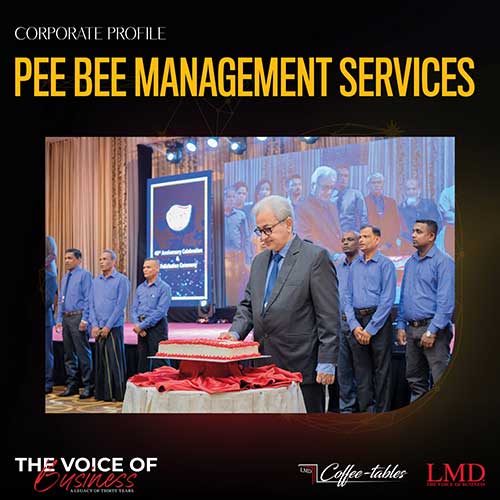CEYLON TOBACCO COMPANY
CEO
Deputy CEO
Director
Legal, Corporate and Regulatory Affairs
Q: What are the core values that Ceylon Tobacco Company (CTC) stands for?
Fariyha Subhani (FS): At CTC, we prioritise creating an inclusive environment where everyone feels respected. Our commitment to integrity ensures that we always act responsibly and ethically.
Our consumers and customers are at the heart of everything we do, and we’re continuously looking for novel ways to serve them. Trust is foundational to our culture, empowering employees to innovate and collaborate effectively.
These values are not merely ideals – they are the principles that underpin our daily operations and long-term strategies. As an organisation, we’re constantly evolving and transforming. Our current values have been shaped by our people and are a true representation of CTC’s culture. And for this reason, we’re truly proud of what we stand for.
Q: How does CTC foster a positive workplace culture, and what initiatives are in place to promote employee wellbeing and satisfaction?
Kushani Dassanayake (KD): CTC fosters a positive workplace culture and promotes employee wellbeing through initiatives that include multiple communication channels, an open door policy and a robust grievance mechanism with a ‘speak-up’ channel to ensure employees can raise issues without fear. This has helped us create a thriving, discrimination free workplace.
Recreational activities like the annual sports day, quiz nights and cultural events enhance engagement.
CTC’s Wellbeing Unlimited – an initiative that focusses on the physical, mental, financial and social wellbeing of all employees – is brought to life year-round through various activities and events that benefit the CTC community.
Our local leadership team and shadow leadership team both comprise 50 percent representation of both genders. CTC is committed to DE&I (diversity, equity and inclusion) to foster an inclusive culture.
Q: And how would you describe CTC’s journey over the last three decades? What have been its most significant milestones during this time?
Kavinda Nanayakkara (KN): CTC focusses on expanding and modernising its manufacturing capabilities, strengthening its market leadership by introducing innovative products and adapting to changing consumer preferences.
Over the past three decades, CTC has achieved significant milestones. In 2020, we unveiled a new corporate logo aligned with BAT’s brand identity. And in 2021, CTC became the first end market within the BAT Group to achieve carbon neutrality in scopes 1 and 2.
We continue to learn from past experiences and have significantly increased efficiencies. Our factory in Colombo is certified for integrated work streams (IWS) – a testament to our commitment to continue to evolve.
Our human resource best practices and truly inclusive culture create an environment that is conducive to employees of all walks of life, genders and generations
Finance Director
Director
People, Culture & Inclusion
Director
Operations
Q: What is the role of corporates such as yours in reviving Sri Lanka’s economic and social landscape?
Zahrah Cader (ZC): As a leading tax contributor and significant value injector to the rural economy, CTC drives economic progress by creating employment opportunities, and investing in modernising our manufacturing capabilities and technological advancements.
Our commitment to sustainability is demonstrated through comprehensive environmental, social and corporate governance (ESG) initiatives focussed on environmental protection, waste management and community upliftment. We support national efforts to combat water crises among rural communities, provide disaster relief and enhance skills through vocational training, contributing to long-term economic growth.
Our best in class corporate governance is award winning, and has been recognised by Transparency International and the Ceylon Chamber of Commerce.
At CTC, we prioritise human capital development by offering extensive training and development programmes.
Q: In your view, what are the most important goals for local corporates to achieve in the medium term?
FS: Corporates should focus on several key goals to ensure sustainable and responsible growth.
Firstly, enhancing governance practices is crucial. Implementing robust frameworks that ensure transparency, accountability and ethical conduct will build trust and credibility with stakeholders.
Secondly, promoting sustainability is vital – this involves integrating sustainable practices into all aspects of business operations, reducing environmental impact and committing to social responsibility initiatives that benefit local communities. Embracing renewable energy and reducing waste are practical steps in this direction.
Lastly, driving innovation and growth is essential for staying competitive. Investing in new technologies and processes can improve efficiency and reduce the ecological footprint. Moreover, fostering a culture of continuous improvement and adaptability will help businesses navigate future challenges effectively.
We support national efforts to combat water crises among rural communities, provide disaster relief and enhance skills through vocational training, contributing to long-term economic growth

Q: How does your organisation view the talent in the country in the wake of the brain drain?
KD: CTC recognises the challenges posed by the brain drain, particularly the migration of highly skilled talent seeking opportunities abroad. This phenomenon has a significant impact on the local talent pool and presents challenges in maintaining a robust workforce. However, we see this as an opportunity to innovate and adapt.
We are committed to attracting and retaining top talent within Sri Lanka by creating an engaging and supportive work environment. Understanding the aspirations of the younger generation, who now form a significant part of our workforce, we emphasise purpose driven work, opportunities for continuous learning and career advancement.
Our initiatives include mentorship programmes, leadership development and a strong focus on work-life balance to meet their expectations and retain their skills.
CTC recently welcomed its first cohort of interns under a six month long project-based internship programme named Ignite, which is an initiative that aspires to nurture the next generation of talent by providing meaningful, hands-on experiences that will shape future careers of aspiring professionals.
Q: What’s the role of technology at CTC and in its operations? And how has it evolved through the years?
Towhid Akbar: At CTC, technology isn’t simply a support system – it’s the heartbeat of our operational excellence and strategic innovation. From optimising supply chains to enhancing customer experiences, the role of technology has evolved dynamically over the years.
Our aim is to build a stronger, simpler and faster business that’s more sustainable to withstand dynamic business challenges. CTC always strives to remain ahead of the curve in embedding technological solutions that both leverage existing opportunities and are sustainable.
Embracing paperless billing through digital invoicing has also cut costs and reduced our environmental impact, showcasing our dedication to sustainable practices. Technology remains central to our strategy, driving continuous innovation and operational improvements.
Q: What are your organisation’s plans for the future?
KN: As an organisation, CTC has stood the test of time. We continue to evolve and keep pace with the times, whether it’s with our people, stakeholders or consumers. We’ll continue to reflect the pulse of all stakeholders be it through the product portfolio or enhancing manufacturing capabilities.
Any evolution will always have at its heart and be driven by consumer preferences, while maintaining sustainability and responsible business practices. Operational efficiencies will be optimised, focussing on long-term value creation for stakeholders.

Q: How do you see the landscape of STEM (science, technology, engineering and mathematics) evolving in Sri Lanka?
Richard Taylor: The landscape of STEM in Sri Lanka is evolving rapidly with significant advancements and growing recognition of its importance in driving the country’s future. We are seeing increased investment in STEM education and a surge in interest among the younger generation in pursuing careers in these fields.
This shift is critical as it equips our youth with the skills necessary to compete in a global market and fosters innovation across various sectors, including robotics, digitalisation of day-to-day work and utilisation of AI.
At CTC, we are committed to supporting and nurturing this evolution. Engineering careers at CTC are a prime example of how STEM disciplines are integral to our operations. Our engineers with STEM backgrounds are pivotal in modernising our manufacturing processes, ensuring the highest standards of product quality and driving operational efficiency.
Our human resource best practices and truly inclusive culture create an environment that is conducive to employees of all walks of life, genders and generations.
We also aim to increase female representation in STEM especially in factory engineering roles by investing in mentoring programmes for female STEM undergraduates.
These programmes provide guidance, support and real world insights, helping them navigate the transition from academia to industry. Connecting these young women with experienced professionals can build their confidence and competence in engineering roles traditionally dominated by men.
Q: And finally, how important are good governance frameworks in the operation of listed entities?
ZC: Good governance frameworks are crucial for listed entities as they ensure transparency, accountability and ethical behaviour in operations. These frameworks establish clear guidelines for decision making, risk management and performance evalu-ation, promoting investor confidence and protecting shareholder interests.
CTC’s governance structures, policies and frameworks are aligned with the best in class practices of BAT and comply with local regulatory requirements. These efforts not only enhance operational efficiency but also contribute to sustainable growth, long-term stability and reputation enhancement in the market.
CTC maintains an exemplary standard of compliance and is proud to have shared these best practices with other corporates in the country so as to do our part to elevate the standards of corporate governance across the country.
– Compiled by Tamara Rebeira
Telephone: 2496200 | Email: Contact_CTC@bat.com | Website: www.ceylontobaccocompany.com











